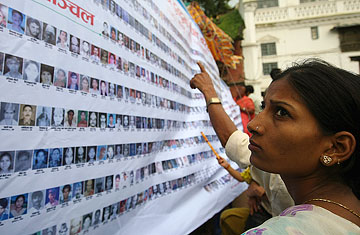Bandarmude victims demand justice 11 years after bomb attack; Gurung rules out amnesty for serious HR violators

File Photo
Chitwan / June 5: The victims of the infamous Bandarmude bomb attack at southern Madi of Chitwan have reiterated their demand for justice.
Bandarmude Blast Victims’ Struggle Committee Vice Chairman, Krishna Adhikari, said the victims were increasingly suspicious of getting justice and appealed for not inflicting more pain on the victims.
In the bomb attack by the then CPN (Maoist) combatants on a moving passenger bus on June 5, 2005, 38 commuters were killed while 72 injured. The ill-fated bus (NA 2 Kha 3245) was heading towards Narayangadh from Ayodhyapuri.
Among the injured four have already died while four more are under regular medication for mental health problems known as Post-traumatic Stress Disorder (PTSD).
The condition of the injured has not normalized, said Committee Vice Chairman Adhikari. He said Ganga Bahadur Gurung, who sustained injuries to his head, died two years after while Chunu KC died four years later. Likewise, Narhari Sapkota died one and a half year ago and Narayan Dutta Poudel three years later.
A meeting with the Truth and Reconciliation Commission held three months ago has also not been effective, victims say. The Commission had met with the victims including those losing their loved ones and the government officials at various parts of the district for two days.
During the meeting, victims pressed for justice and pointed out there was no space to accommodate reconciliation for such an incident against humanity.
Meanwhile, chairperson of Truth and Reconciliation Commission (TRC) , Surya Kiran Gurung, reiterated that those involved in serious human rights violation during the armed insurgency would not get amnesty.
Gurung spoke to journalists while visiting Sindhulimadhi to take stock of the Commission’s investigation in the district.
He warned that the more we keep with us the wound received during the conflict era the more dangerous it will become.
The TRC Chairman added further that the socio-economic revolution envisaged by Nepal’s political parties would be possible only through a correct remedy for the festering wounds.
Even if the perpetrators of serious human rights violation did find amnesty under political pressure, Gurung said, the person in question will not be liberated from the scrutiny of the international law and eventually face the fate of Colonel Kumar Lama.
Nepal’s peace process will not come to a successful conclusion if the government does not implement the Commission’s report, Gurung argued.
The Commission has carried out an impartial study into the armed-conflict era incidents in Doramba of Ramechap, Bandarmude of Chitwan and Kapilvastu among other places, Gurung shared, adding that those guilty of such incidents cannot be allowed impunity under any circumstances. He said recommendation would be sent to the government for legal action. RSS
